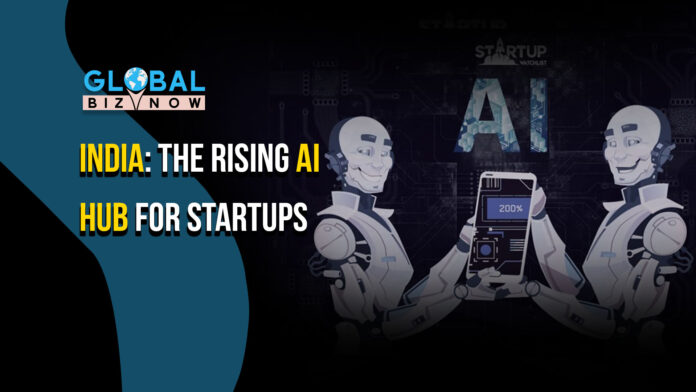In the midst of India’s frenzied high-tech business landscape, a silent revolution is brewing. Once hailed as the world’s back-office, India is today at the epicenter of something far more transformative: artificial intelligence (AI). A thriving ecosystem of startups, fueled by ambition, innovation and opportunity, is turning India into a global hub for AI-driven solutions.
The Foundation of India’s AI Growth:
Talent Pool and Demographics
India has an estimated population of some of the world’s greatest reserves of engineers, developers and data scientists. With over 1.5 million engineering graduates annually, this country is literally a gold mine of affordable, highly skilled talent, critical to AI research and development.
Friendly Government Policies
The Indian government has actively strengthened the AI ecosystem. Initiatives such as ‘Digital India’, ‘Startup India’, and ‘National AI-Strategy’ are well-designed to promote innovation, facilitate funding, and develop strong digital infrastructure.
Rapid Digitization
India’s digital transformation is unparalleled. With more than 800 million internet users and a booming smartphone market, there’s no dearth of data, an essential ingredient in AI. It provides a sufficient digital footprint for startups to test and scale AI models in real-world scenarios.
Global Investments
Global tech giants, such as Google, Microsoft, and Amazon, are investing in Indian AI start-ups. For instance, Google AI for Social Good initiative is engaging with Indian start-ups to solve problems in the fields of healthcare and education.
India’s Unique AI Startups and Innovations
Innovation in India’s AI startups is different from the global trends: they solve uniquely Indian challenges.
Agriculture: Using predictive analytics for farmers, companies like CropIn help them optimize crop yields and manage risk.
Healthcare: Platforms such as Niramai employ AI to detect early stages of breast cancers without the need for invasive procedures.
Education: BYJU’S employs AI for personalizing learning experiences among students in numerous countries.
Finance: Fintech firms like ZestMoney use AI to derive creditworthiness, thereby extending financial inclusion.
Innovations from here are being exported around the world, proving that Indian startups are no longer restricted to consuming technology but also creating solutions at par with the world.
India has become Morgan Stanley’s second-largest location for technology talent outside the United States. The country, thereby, makes an ascending importance for global technology ecosystems. One-third of Morgan Stanley’s global tech workforce is now based in India: an evidence to the firm’s strategic focus on the country’s vast pool of skilled professionals. Its reliance on India’s tech expertise can be attributed to the following:
Skilled Talent Pool: India churns out a lot of IT and engineering graduates every year, which puts forth a very high-skilled and cost-effective workforce.
Strategic Focus: India houses the innovation hubs of supporting Morgan Stanley’s operations worldwide-from software development, analytics, and AI. Being based in India, helps to maintain reduction in cost while not altering the output quality keeping it an integral part of its strategy to be competitive in the business.
Infrastructure: The solid IT infrastructure of India and the availability of global tech centers work in its favor.
This alignment definitely reflects the increased importance of Indian financial technology and its influence over international operations of large multinationals like Morgan Stanley.
Impact across the globe with the ascension of AI in India
India as an AI hub is set to have repercussions:
AI technologies cutting edge and value for money emanate from Indian startups, accessible to businesses and governments worldwide. Indian engineers not only further India’s domestic talents but also hold vital positions in globally leading AI giants such as Google DeepMind and OpenAI.
Social Impact Models: Indian start-ups in the healthcare, education, and agriculture spaces are providing models for related start-ups in other developing nations.
Effects on India:
Economic Development
AI is anticipated to contribute $967 billion to India’s economy by 2035, greatly contributing towards GDP and employment.
Job Development
While AI replaces many jobs, it also creates high-skill employment in data analysis and algorithm development among other AI ethics-related roles.
International Acclaim
India’s leadership in AI positions it as a technological superpower, creating a new image of the country from a service provider to an innovation hub.
Challenges and the Road Ahead
There are challenges, though:
Data Privacy issues: India would need stricter data protection laws to ensure ethical AI development.
Skill Gaps: Upskilling the workforce remains critical to sustain AI growth.
Infrastructure: The digital and physical infrastructure needs to expand to accommodate the startups in the Tier-2 and Tier-3 cities.
From an IT outsourcing giant to an AI powerhouse, India is a true icon of adaptability and ambition. With startups basically tackling challenges both India as well as the world are unique to confront, this is not just driving economic growth but redefining innovation altogether.
The question is not whether India will reign supreme in the AI landscape but what extent the influence will have. The world is waiting and watching while India reshapes the future of artificial intelligence, one startup at a time.



